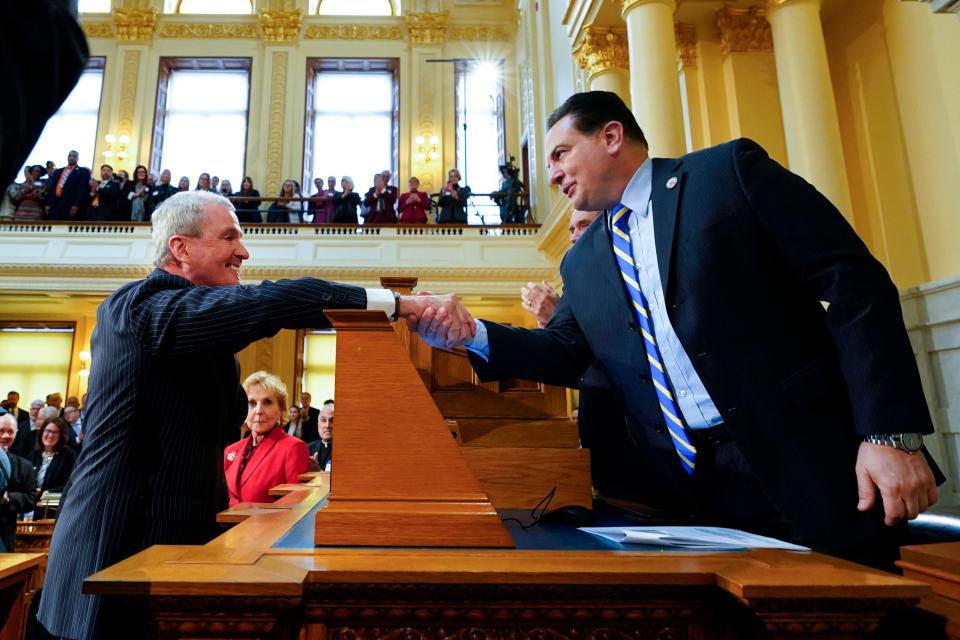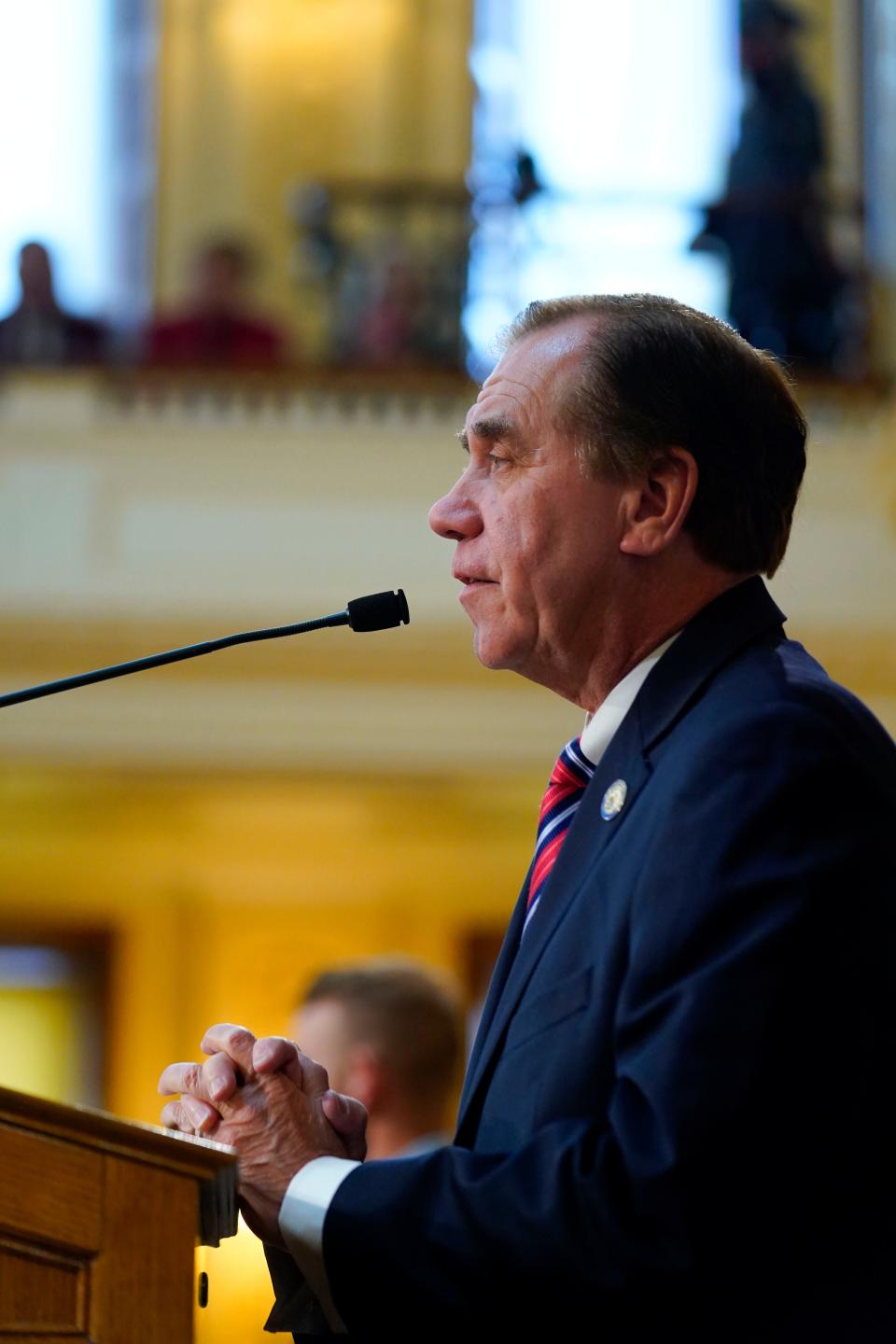Top NJ legislators failed to disclose campaign spending. They still haven't fixed reports
- Oops!Something went wrong.Please try again later.
- Oops!Something went wrong.Please try again later.
- Oops!Something went wrong.Please try again later.
New Jersey’s most powerful legislators, Senate President Nicholas Scutari and Assembly Speaker Craig Coughlin, have not filed amended reports to the state watchdog agency nearly a month after NorthJersey.com reported they failed to properly disclose certain campaign spending.
Scutari recorded expenses as “reimbursements” to himself or staff for close to $600,000 worth of spending — out of a total $1.8 million over the past 15 years — without naming the vendors or businesses the campaign had compensated, which is required.
The reimbursements included trips to Italy, Portugal and Puerto Rico. Scutari, D-Union, also reported receiving smaller amounts of reimbursements on the personal financial disclosure forms he is required to file with the Legislature compared to the amounts he recorded on his campaign finance forms.
"Senate President Scutari is in the process of reviewing and amending his past ELEC reports and financial disclosure statements, and he expects to refile them shortly," said Nick Fixmer with the Senate Democratic Majority on Thursday.

Coughlin, D-Middlesex, failed to itemize $41,000 worth of credit card charges between 2019 and 2021. "Speaker Coughlin is in the process of reviewing and amending his past reports, and he expects to refile the amended reports soon," said Iris Delgado, executive director of the Democratic Assembly Campaign Committee.
Controversial campaign finance overhaul
In the wake of NorthJersey.com’s reporting, critics of a recent controversial campaign finance overhaul said they wanted to examine provisions of the law — mainly a change that slashes the amount of time the New Jersey Election Law Enforcement Commission, a watchdog agency, has to investigate potential campaign finance violations from 10 years down to two years. The change applied retroactively, which effectively killed three investigations into Democratic leadership committees.
More: NJ Senate President Scutari failed to disclose details of about $600K in campaign expenses
More: Murphy signs disputed election finance bill that gives him more power over watchdog agency
Stephen Holden resigned in protest from his post as commissioner of the election enforcement commission along with the other two sitting members hours after Gov. Phil Murphy signed into law the “Elections Transparency Act,” which was sponsored by Scutari.
'You're not allowed to pass special legislation'
Late last week, Holden scheduled an agency meeting, saying the Murphy administration didn’t acknowledge his resignation letter. He said he wanted to discuss the NorthJersey.com story and asked staff to investigate it.
“I wanted to raise public issues, what I consider to be a travesty, of the two-year statute of limitations and its retroactivity in light that the change has a direct financial benefit to the principal author of the statute, Sen. President Scutari,” Holden said. “That’s special legislation and you’re not allowed to pass special legislation.”
The administration then emailed Holden an acceptance of his resignation on Friday night, and the commission canceled the meeting.
Watchdog leader sues Murphy
Separately, Jeff Brindle, the commission's executive director, sued Murphy last month, challenging the constitutionality of the election overhaul law and seeking to block certain sections, including the part that shortens the statute of limitations for investigations, as well as a section that allows Murphy to directly appoint the four members of the agency board without the advice and consent of the Senate within a 90-day period, a power which expires July 2. Murphy has not yet named replacements to the board.
NorthJersey.com “just reported on Sen. Scutari’s problems in his campaign finance reports in which vast sums seem to be described in the vaguest generalizations,” said Bruce Afran, Brindle’s attorney. “This new change in the statute of limitations would prevent anyone from bringing complaints against Scutari for a vast majority of those charges. It eliminates all ability to enforce campaign finance laws in New Jersey. It turns us into a type of Tammany Hall.”
Agency could only look back two years, not 10
On Friday morning, West Orange resident Matthew Dragon, co-chair of Our Revolution Essex County, submitted a complaint to ELEC — a copy of which he provided to NorthJersey.com — requesting an investigation examining Scutari's recent filings.
"Scutari has knowingly and willfully misreported campaign expenses as reimbursements to himself so as to mask the true nature and recipient of those expenses," Dragon wrote in the complaint.
"Scutari is also the Union County Democratic Party Chair, further indicating that he has extensive knowledge of reporting requirements and the campaign finance law," Dragon wrote. "Scutari is also a lawyer, which should imply that he is able to read, understand, and act on the laws of the State of New Jersey correctly."
If the commission takes up the investigation, it has the authority to look back only two years. The Senate president reported almost $18,000 worth of reimbursements in 2021 and $140,000 reimbursements in 2022. ELEC would not be able to examine the $445,000 worth of reimbursements reported between 2007 and 2020.
More: Head of NJ ELEC sues Murphy, says new campaign finance law overhaul is unconstitutional
More: How much do NJ legislators get paid each year? Good luck finding out thanks to skimpy forms
ELEC declined to say if the agency received complaints regarding Coughlin or Scutari’s disclosures, citing confidentiality concerns.
In response to NorthJersey.com’s reporting, Fixmer with the Senate Democratic Majority said: “Throughout a career in public office that has spanned decades, Senate President Scutari has always filed campaign finance reports in a timely and accurate manner. At no point has he ever received any questions from ELEC about his reports, and they have always been accepted without comment.
"We are looking into the issues you raised, and if any additional information needs to be added to old reports, we will do so as quickly as possible,” he said.
“Senate President Scutari believes strongly in having a vital, operational Election Law Enforcement Commission, one that operates quickly and effectively to ensure all candidates follow current election finance reporting laws,” Fixmer said.

Scutari defended the scaled-back statute of limitations during debate on the bill, arguing that investigations often drag on after an official being scrutinized is out of office.
“Imagine getting a traffic ticket two years after you went through a red light and there would be nothing that you could do about it,’’ Scutari said in March. “That’s what’s being allowed for there.”
Conflicting forms
Scutari also did not properly record the reimbursements he received from his campaign account on nine years of personal financial disclosures, forms he is required to fill out as a member of the Legislature detailing his income, liabilities, properties and other information.
On the 18 years worth of forms online, Scutari noted every year he received less than $10,000 from his campaign under the section titled “Reimbursements or prepaid expenses for travel, lodging or subsistence.”
The forms do not require legislators to record exact amounts. Instead, there are four boxes that include broad ranges of income: 1 is less than $10,000; 2 is $10,000 to $24,999; 3 is $25,000 to $49,999; and 4 indicates $50,000 or more.
But in the nine years from 2012 through 2020, Scutari reported in ELEC filings he received more than $10,000 annually. In five cases, he should have checked the box for “2” and in four cases, the box for “3.”
No government or official review is made to ensure that the information on financial disclosure statements is accurate, according to the Office of Legislative Services.
The office ensures the forms are filed on time, and penalties for not filing a form can include an ethics violation and censure.
“Personal financial disclosures are imperative for confidence and integrity in the lawmaker,” said Craig Holman, an ethics lobbyist for Public Citizen, a Washington, D.C.-based nonprofit. “When these personal financial disclosures are not properly filled out or ambiguous, one has to wonder if the lawmaker is actually trying to cover up something, obfuscate potential conflicts of interests, or if it was just a genuine mistake.”
If the Joint Legislative Committee on Ethical Standards receives a complaint, it has the option of investigating the allegations. Depending on what it finds, the panel of eight public members — not legislators — has the power to impose fines, recommend disciplinary action to the lawmaker’s chamber, or suspend him or her from office.
This article originally appeared on NorthJersey.com: Leaders of NJ Legislature failed to disclose campaign spending details

